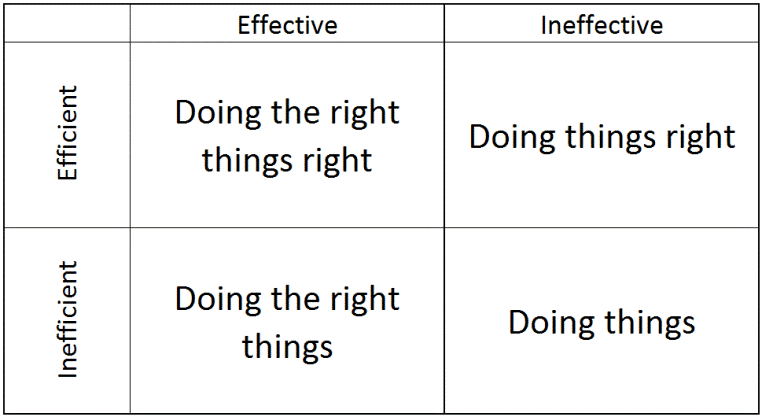5 Effective Design Tips to Increase Donor Giving
October 2, 2019
Positive Solutions – Tell a Better Nonprofit Story!
October 7, 2019Maxie Carpenter Has a New Take On Nonprofits

Kris Putnam-Walkerly (PRNewsfoto/Putnam Consulting Group)
Maxie Carpenter and Development Systems International have a new take on nonprofit leadership.
Maxie asks the question, NONPROFIT LEADERSHIP: EFFECTIVE OR EFFICIENT?”
Effectiveness has always been a driver of Leadership and nonprofit success, particularly since Peter Drucker formulated the rules and required habits of thought in 1967’s The Effective Executive.
This book had an enormous impact on all kinds of leaders in all kinds of sectors, not just the for-profit marketplace because Drucker identified that doing the right thing was the key to effectiveness. He clarified the why of effectiveness in a way no one before him had. However, he left the how for leaders to define on their own.
I’ve been a disciple of Drucker for many years, but I’ve also learned that great men and women of his pedigree are not immune to further dissection and study. Why? Because the environment around us is evolving on a continuum. It doesn’t mean that the principles he and others like him set forth aren’t relevant anymore by any stretch. What it does mean is that the context of those principles is evolving, as well.

So, what is the trouble with effectiveness and what does it have to with Nonprofits?
Since the financial collapse of 2008 (and because of my background), I’ve been trying to get Nonprofits to look at their organizations more like a business, rather than exclusively as a charitable outreach. The biggest obstacle then (as it still is today) is what I call the RC Factor (Resistance to Change) embedded in the culture of Nonprofit Boards of Directors and Executive Directors.
On its own, and regardless of sector (for profit or Nonprofit), effectiveness sets no time limits. In an era when organizations could afford to take their time because of limitations with distance and technology, projects could take many months. For example, something that should have taken four months could take much longer. That kind of urgency won’t cut it anymore. There are organizations developing groundbreaking initiatives with no sense of urgency, only to have their competitors beat them to market. Nonprofits better start accepting the fact that they are competing with each other, more specifically for resources and capacity.
As I’ve been saying since the earth cooled, long-term strategies, even those of a year or less, have proven to be less supportive of survival than Adaptability Planning, which is being able to pivot in the moment based upon what’s happening in the environment, both internally and externally. The entire marketplace is just moving too fast.
I’ve written and talked before about the four influences that shape an individual’s values on a continuum. It’s the same for organizations, as the mandate for flexibility and agility has been brought on by recent economic shocks, such as the financial collapse of the country alluded to herein, and the terrorist attack on the US in 2011. Hardly a day goes by that those two events are not still made mention of.
So, what is the trouble with efficiency?
If you’re able to objectively see the flip side of anything, you can also entertain my response to this question, which is that efficiency unrestrained by effectiveness can prove debilitating, and this is especially true for Nonprofits.
For example, as recently as 2013, a demolition crew in Fort Worth, Texas, did an excellent and very effective job of demolishing a house. The only problem was that it was the wrong house. The code enforcer had put the wrong address on their forms, and no one was home to inform the crew otherwise. In short, they did the right thing wrong. What’s even more ironic is that the very next day, they did the same thing at a different location. Why? Because they didn’t recheck the rest of their demolition orders. I’ve seen Nonprofits keep doing the same things over and over for years, always expecting different results. We all know what the definition of that is.
So, what does all this have to do with Nonprofit Leadership?
We have to stop talking about Leadership exclusively in terms of effectiveness (profitability, or in the case of Nonprofits, outcomes) and start talking about efficiency (or sustainability), as well. Just doing the right things isn’t enough anymore, nor is just doing things right. In short, leaders have to focus not only on doing the right things but doing the right things right.
This tsunami of change in our environment isn’t going to abate. Leaders of today have to be willing to embrace new habits that combine effectiveness with efficiency.
Truth Be Told, those people and communities depending upon them for a higher standard of Leadership really won’t settle for anything less.
Thank you for spending time with me
Maxie Carpenter Has a New Take on Nonprofits was written by Maxie Carpenter a consultant with Development Systems International, author and speaker, focused upon Organizational Development and Leadership Character & Behavior. Maxie was formerly with Wal-Mart for 27 years, beginning in 1973 as a stock person and eventually attaining the positions of Assistant Manager, Store Manager, District Manager, Operations Coordinator for Walmart US, Director of HR & Talent Development for Walmart US, and retiring in 2000 as Vice President of HR & Talent Development for Walmart US. He’s pursued several interests, providing an expansive experiential perspective to individuals and organizations across the country in the academic, nonprofit, corporate and small business communities. His focus has been on Organizational Structure and Function with an emphasis on Culture & Ethics and Senior Management Development in the area of Character and Behavior Assessment. Maxie’s taught as an Adjunct Professor in the Don Soderquist School of Business at John Brown University, and in the Sam Walton College of Business at the University of Arkansas. He was most recently Director of Operations for the Samaritan Community Center, the largest feeding nonprofit in the State, leaving this past December to focus on Nonprofit Consulting and Leadership Character & Behavior. His mentor, Sam Walton, with whom he directly and indirectly interacted over the course of his career, heavily influenced Maxie’s perspective with the core of Authentic Leadership. Maxie’s authored several publications, including Managing Difficult People in the Workplace: A Practical Guide to Confronting Difficult People and I Didn’t Ask You to Dance! I Asked You to Talk: A common sense, humorous and at times, spiritual approach to communication in a world obsessed with political Correctness! Maxie Carpenter is a self-described servant leader, who believes that people put you where they want you based upon how you treat them. Maxie Carpenter is the only professional in the state Certified as a Facilitator, Coach & Consultant to administer the Merit Profile™. This assessment measures an individual’s character attitudes, beliefs and commitments over ten primary leadership principles in order to recognize opportunities for improving personal leadership effectiveness. The Merit Profile also greatly improves the predictability of an organization’s human capital decisions regarding culture, talent acquisition, employee development and employee retention initiatives. Maxie is a proud member of National Association of Nonprofit Organizations & Executives. Maxie is also founder The Leadership Consortium.
